Sat 8 Jan 2022
A British TV Series Review by David Friend: DICK BARTON – SPECIAL AGENT.
Posted by Steve under Reviews , TV mysteries[10] Comments
DICK BARTON: SPECIAL AGENT. Southern TV, UK, 1979. Tony Vogel (Dick Barton), Anthony Heaton (Snowey White), James Cosmo (Jock Anderson). Creator/screenwriter: Norman Collins. Other screenwriters: Julian Bond, Clive Exton.
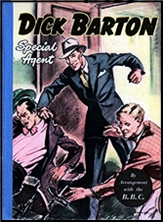
Back when radio was the most significant medium for home entertainment, fifteen million people would listen nightly to Dick Barton: Special Agent, an action adventure serial replete with cliff-hangers and derring-do, on the Light Programme. It followed the adventures of former commando Captain Richard Barton and his two friends ‘Snowy’ White and ‘Jock’ Anderson as they repelled the plans of various criminal masterminds and somehow escaped the perilous traps that were repeatedly set for them.
The radio serial ran between 1946 and 1951, usually at 6.45 pm, for fifteen minutes apiece. 711 episodes were made, all written by Geoffrey Webb and Edward J. Mason, and each adhering to the thirteen rules of conduct which decreed that Dick could not use bad language, drink alcohol or use a knife to harm. Apart from the hero’s name and the adventure it evokes, the serial is best remembered for its theme tune, “The Devil’s Gallop,” a rousing and rambunctious slice of genius by composer Charles Williams which makes one want to dash about the room and press against the wall as though hiding from fiendish saboteurs.
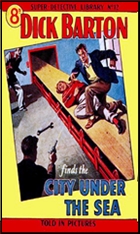
The nanny state killed the show off after five years in the belief that it was damaging to the dear young children. By this time, however, the show was a nationwide phenomenon, spawning a behind-the-scenes book, another volume of short stories and three films from Hammer Studios (at the time, best known for making thrillers, not horrors). The BBC then replaced it with a rustic drama named The Archers, the theme tune of which must have made every red-blooded adventurer used to Barton’s buccaneering wish for another war.
The late 1970s saw a minor revival for Dick and his friends. A somewhat sparsely written but nonetheless enjoyable book, novelising three of the radio serials, was published in 1977. That same year, filming took place on a televised series of new adventures. Made by Southern Television, a small ITV company, each episode lasted ten minutes (excluding commercials) and shown on Saturdays and Sundays from January to April 1979.
The 32 episodes starred Tony Vogel as Barton, Anthony Heaton as ‘Snowy’ and James Cosmo as ‘Jock’ and comprised four adventures, each lasting between six and ten parts each. Typically for its time, the serial was shot on video, a format which can make the most expensive television look cheap. Such an impression, in this instance, would be accurate as there were apparently several budgetary issues which undermined the production of the programme.
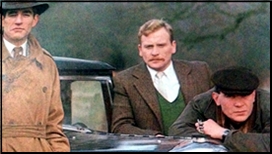
This is mostly apparent in the sometimes dodgy direction work, though it can only be imagined that the director was doing his best with the little he had. The location work – usually one of the most costly features of scripted television – is plentiful and the acting is more or less solid throughout. As you would expect from such a short serial, the whole thing runs like the clappers, and the scripts – many by Clive Exton, who would later bring Poirot and Jeeves & Wooster to television – wisely play it straight throughout. There is, of course, the odd bit of wince-inducing dialogue, but all such things can be waved away as attempts at period authenticity.
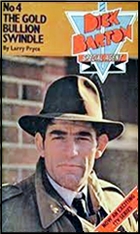
The first adventure sees an old bird named Sir Richard Marley call on Barton when his daughter Virginia and son Rex go missing. They have been kidnapped by the dastardly foreigner Melganik, who plans on substituting tobacco with reefer and thus turning the whole of Britain into “drug fiendsâ€. The story lasts ten parts, co-stars future Strictly Come Dancing contestant Fiona Fullerton and memorably includes the old walls-closing-in-with-spikes routine.
The second adventure, in eight parts, starts a little too similarly as a young girl – this time an old acquaintance of Jock’s – is in danger when her scientist father is kidnapped by the evil Muller. The third serial ties in neatly with the first two and involves a disappearing house, while the last adventure sees the team encounter a couple of menacing, Kray-like gangsters.
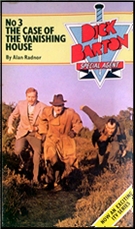
The series is available on DVD and can sometimes be seen nightly on Talking Pictures TV – which is how I saw it. Tony Vogel is outstanding in the part of Barton. He takes it all seriously, remains believable in the period, and can even be tough when he wants to be. The whole thing is basically a children’s show, of course, but it was always going to be and is none the worse for it.
The only downside is the brevity of the episodes: it may have made more of an impact had it been shown in half-hour instalments, like Doctor Who. As it was, for whatever reason, the show was not a success and was quickly forgotten. The production company itself folded within a couple of years.
Dick Barton did not return again until the late ‘90s and then only on stage in live theatre (perhaps inevitably, as he had already featured in every other medium). With only four cast members, the nine plays were comedy-musicals which parodied the brand, boasted innuendo and were mostly staged at Croydon’s now-closed Warehouse Theatre.
The last we have so far heard from Dick and his friends is, funnily enough, due to the TV version. The series produced four novelizations and one of them, The Mystery of the Missing Formula, was released in 2010 on CD and read by a thoroughly game Toby Stephens.
After all these years, I don’t think anyone is quite sure just why a British private detective is walking around calling himself a special agent, but I certainly hope he makes another come-back at some point. Cue music!

January 8th, 2022 at 8:36 pm
I have the Barton books pictured here. The impact of the character on a generation of British youth was profound, the world of children stopped for that fifteen minute serial in the UK.
Eric Ambler paid tribute to Dick Barton in the comedy thriller HIGHLY DANGEROUS where a British scientist in Eastern Europe gets hit on the head and she thinks she is the hero of her nephews favorite radio serial secret agent ( his name is Francis and she changes it in her mind to Frances ).
A few of the serials can still be found and listened to and a few comic adaptations.
The three movies with Don Stannard were early Hammer productions and not bad. Sebastian Cabot is the villain in one and Patrick Macnee a murdered British agent in another.
There have been several successful stage adaptations of Barton done tongue in cheek aka BULLSHOT CRUMMOND.
January 9th, 2022 at 10:17 am
“The nanny state killed the show off after five years in the belief that it was damaging to the dear young children.”
Not sure about that – Dick Barton ended on 30 March 1951, a few months before a Conservative government took office.
The Archers are still running.
January 9th, 2022 at 1:42 pm
As far as I’m aware, Roger, the term isn’t used in reference to the Tories specifically.
January 9th, 2022 at 4:37 pm
They’re the ones who have nannies, though, David Friend. One of the most infamous, Jacob Rees-Mogg, sent his aged nanny out to campaign for him in elections. However, they’re the ones who disapprove of the state acting as a nanny for other people.
Dick Barton ran through six years of Labour government, which suggests he was an agent of the nanny state.
It sounds as if Highly Dangerous was derived from Ambler’s first – uncharacteristic – novel. The Dark Frontier, David Vineyard. It involves a male scientist who has a nervous breakdown/concussion (it’s decades since I read it) and is convinced he is a secret agent…
January 9th, 2022 at 7:45 pm
Roger Allen, it is derived from Dark Frontier but establishes the heroines nephew is addicted to a radio serial about a Dick Barton like special agent who she comes to believe she is after a blow to the head. Ambler updated his plot made the scientist a woman and added an American bemused and confused by the scientists sudden personality change and added the modern element.
I’m sure he didn’t expect anyone to connect the two. He kept DARK FRONTIER out of print in his dissatisfaction with it for most of his career, only relenting toward the end.
January 9th, 2022 at 7:53 pm
My first thought when looking at the third still photo:
I’ve never seen a copper-colored trenchcoat!
It looks cool.
The 1970’s were sometimes adventurous in design.
January 10th, 2022 at 1:13 pm
it looks like I missed a rarity when I bought Dark Frontier. I passed it on to the friend who introduced me to Ambler, and from there…. If I remember rightly the personality change – indrrd, the “agent”‘s odd personality – is in the book too. If I can remember it after several decades, it can’t be as bad as Ambler thought it, even if it isn’t archetypal Ambler.
January 11th, 2022 at 11:07 pm
Coincidentally, I sampled the British OTRR radio series recently. I only found seven episodes available free online, and I enjoyed them during the course of one evening. But they’re not something I’d probably ever return to. Listened to it more for the dialect and accents than anything else.
Because, it’s rather a little too pat in plot and plot-devices. One example from the first episode: Barton is out golfing and, following a lost ball –discovers a secret tunnel in a sand-trap. Kidnapped scientists are being held inside. Umm…okay.
‘Stock’ characters (loyal batman, etc) just a bit too trite for the modern ear –even my ear, which is very forgiving to ‘the sound’ of past decades. I like it, but only so far.
More of a curiosity (this radio serial), I’d say. I love the English and I love Brit culture but this was a slight strain to find something to relate to. It is “veddy veddy British”.
January 12th, 2022 at 12:49 am
Dick Barton was a semi-joke from the first – what’s trite now were tropes then. Children loved it because they’d never come across anything like it, their parents because they had.
January 12th, 2022 at 11:14 pm
DARK FRONTIER wasn’t bad, even Ambler didn’t think it was bad, unlike Graham Greene’s feeling about THE NAME OF THE ACTION his estate still tries to suppress. It just didn’t fit in with his more serious work and wasn’t as good as he would like. I think he felt the tone wasn’t right and perhaps satire wasn’t his strength at the time. It was the end of the Fifties until he attempted another light-hearted entry, THE LIGHT OF DAY.
Ambler even confessed it was better than he remembered when he allowed it to be reprinted. It’s not unusual for writers to have those mixed feelings about early books, no few have one they wouldn’t even let out of the desk drawer.